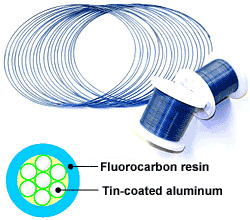May 31, 2012
KYOWA ELECTRIC WIRE CO., LTD.
KYOWA ELECTRIC WIRE CO., LTD. (Head Office: Osaka-shi; President: Hisakazu Ishibashi; “Kyowa Electric Wire” hereinafter) of the Furukawa Electric Group has developed KANZACC–ALC-T-ETFE and KANZACC–ALC-T-FEP fluorocarbon resin-covered aluminum wire – lightweight aluminum-based wire that can be soldered.
Kyowa Electric Wire’s fluorocarbon resin-covered aluminum wire is lightweight and highly reliable, using tin-coated aluminum as the conductor and fluorocarbon resins such as FEP and ETFE as insulators. The aluminum conductor can easily be soldered and the fluorocarbon resin insulator has outstanding electrical properties and resistance to heat and chemicals, making the wire capable of handling tough environments.
The company’s series of fluorocarbon resin-covered aluminum wire, with the addition of an aluminum conductor to its lineup of copper, copper alloy, steel and stainless steel, now meets a broader range of needs.
Taking advantage of its ability to run the entire production process from metal coating of conductors to coating fluorocarbon resin, Kyowa Electric Wire will begin sales of fluorocarbon resin-covered aluminum wire in May 2012, aiming at 200 million yen in sales for fiscal 2013.
Characteristics

Fluorocarbon resin-covered aluminum wire
Lightweight, highly reliable wire
Insulator: Fluorocarbon resin
Has excellent electrical properties, is resistant to heat, cold, chemicals and weather, and flame retardant.
FEP, ETFE and PFA are available as fluorocarbon resin.
Conductor: Tin-coated aluminum
The aluminum conductor can be soldered and is highly resistant to corrosion.
Nickel, copper and silver are available as metal coating other than tin, and with copper, copper alloy, steel and stainless steel to choose from as the conductor, the product can be designed to meet a variety of uses.
Uses
- Wiring materials for automobiles or in electronic, telecommunications and high-temperature devices that require lightweight properties
- Wiring materials or lead wire for equipment demanding chemical resistance, or as wiring material for ammonia refrigerant peripherals or magnet wire for motors.